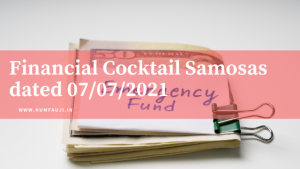Emergency Fund – your all-time saviour
Covid scenarios have made a lot of us realise the importance of having some ready-money available at all times at hand for contingencies. This is what an emergency fund actually is, as advocated by all good financial planners, which everybody needs to have before anything else financially is really even attempted.
An emergency fund can help you ride through difficult financial situations more easily as also cover financial shocks like losing the job, or large unexpected expenses.
Few things to keep at the back of your mind while parking your emergency funds:
- Safety and Security of your money
- Easy access and early liquidity
- No mixing of investment and emergency funds
- Taxation, exit load and penalties when you take out the money fully or partially.
Where to park your emergency funds? Options available are:
Cash: Liquid cash might not be the ideal avenue considering safety issues as well as zero returns.
Savings account with sweep-in facility: Sweep-in facility is where amounts over and above a set limit are converted as FD and can be withdrawn post payment of penalties, if any.
Short-term FDs: Better returns than savings account but terms and conditions of premature encashing need to be read before opening a deposit account.
Liquid MFs: They invest in short-term fixed-income securities like CDs, T Bills, etc. They offer a slightly higher return than short term FDs and are more liquid with no time-maturity limit or pressures.
Please remember that the amount of emergency fund that needs to be kept should be very carefully worked out. Too much of it will waste your money with sub-optimal returns. Too less will defeat the very purpose of it.
One useful hack – Credit Card limits can substitute as part of your emergency fund at zero cost and blockage of your money, provided you have the discipline required to use a credit card carefully.
An emergency fund is like your parachute that saves you from a freefall in the event of any financial crisis. Give it the importance it deserves.
(Contributed by Radhika Chandak, Financial Planner, Team Vikrant, Hum Fauji Initiatives)
Stuck in a bad insurance policy – What to do now?
When we go to the market to buy essentials, we often end up buying many other things which either may not be required by us or worse still, are of no use to us. This is what good marketing does – a good sales guy’s pitch, attractive packaging, bundling (1 for 1 kind), buy-now-pay-later and more. We’re lured into buying asap without thinking about its utility or effectiveness to us.
This phenomenon is not limited to shopping malls only but extend to other spheres of life too – for instance, when you want to buy a good investment product but end up buying an insurance policy instead. Yes it’s good to have effective insurance but not the kind that is generally sold to people.
But then what do you do if you already have got into such an insurance policy sales trap?
- If you’re lucky enough to realize that you’re boarded a wrong train before its departure, better to get down at the earliest – isn’t it? As per IRDA guidelines, when you buy an insurance policy, you have 15 days free look up period after you receive your policy documents. If you return it, the insurer will return the premiums paid after deducting the small mortality charges, health check-up charges, and stamp duty.
- Cash out the policy:Whole life insurance has a cash value account, which earns interest over time. Every policy has a cash surrender value, which is the cash value amount minus fees and penalties.
- Reduced Paid up option:This option comes with the fewest fees. A reduced paid-up option allows you to stop paying premiums in exchange for a lower death benefit. The reduced benefit is based on the premiums you’ve already paid, and coverage lasts for life.
- Continue with the policy:If the maximum number of premiums have already been paid, then it is the can’t-do-anything option – better to griy your teeth and continue with it rather than face huge losses on the surrender/paid up option.
Still have queries on this issue? Please contact your financial planner at Hum Fauji.
(Contributed by Rishabh Shukla, Financial Planner, Team Vikrant, Hum Fauji Initiatives)
What is your relationship with your financial advisor?
Children cry for so many things – justified or unjustified. Depending on their stage of life, it could be toys, junk food, fashion accessories, clothes, two or four wheelers, independent decision making, etc. We as parents generally do not succumb to all their desires if it is not good for them. We analyze their real needs, the pros and cons of each and every desire, and then make a decision on what is good for them now and in future.
Initially, the children might feel bad about their desires not being fulfilled but in the long run, they are indeed thankful to their parents for the controls imposed on their unjustified demands.
Investment planning also goes through the same cycle. Investors, in the initial stages, pass through various temptations based on what they see and hear on TV channels, read in newspapers and on the internet, their own cycle of fear-and-greed, ‘advice’ from friends and colleagues, and many more such behavioural biases. It results in the tendency of looking for quick gains irrespective of their own personal knowledge, credibility and motive of the source of their information, FOMO (fear of missing out) effect, and of course, greed. This normally results in a disaster in their portfolios due to frequent switching of investments, changing investing tactics, and even changing their advisors. Here, a good Financial Planner has to don the robes of a parent and guide the investor correctly in spite of, maybe, stiff resistance from him.
Unfortunately, with the easy availability of digital investment platforms, which make it very easy for the itchy fingers to add, subtract and switch investments, most of the novice DIY (Do It Yourself) investors learn the wrong lessons and end up severely damaging the attainment of their long term goals and requirements. After some time, when they’ve had enough of this self-inflicted injury, they abandon prudent investing altogether which is actually such a sorry state to be in for them and their families.
A relationship with a machine/robotic advisory can never match a human relationship/personal connect provided by a financial planner.
(Contributed by Jatin Uppal, Deputy Manager Financial Planning, Hum Fauji Initiatives)



